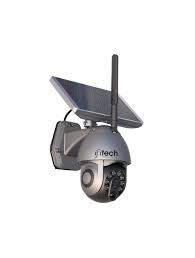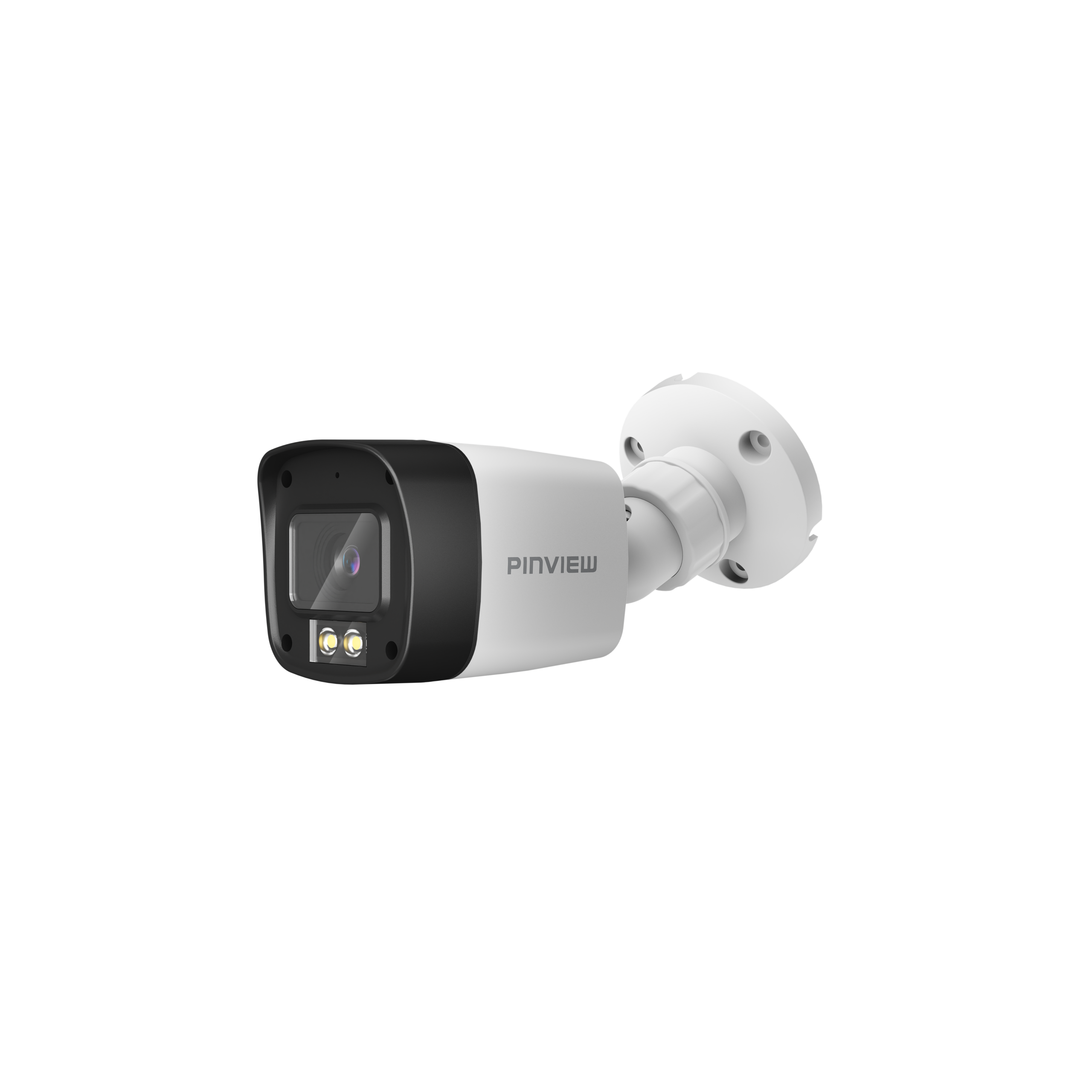Solar Powered CCTV Camera: Harnessing the Power of the Sun for Enhanced Security
In an era where security is of paramount importance, technological advancements have revolutionized the way we protect our homes, businesses, and public spaces. One such innovation that has gained significant traction is the solar-powered CCTV camera. Combining the benefits of solar energy and surveillance technology, these cameras provide a reliable and eco-friendly solution for enhanced security.
Traditional CCTV systems typically rely on a constant power supply, usually from the electrical grid or batteries. However, solar-powered CCTV cameras operate independently by harnessing energy from the sun through photovoltaic panels. This self-sustaining feature makes them an ideal choice for remote locations or areas with limited access to electricity.
The integration of solar power into CCTV systems brings several advantages. Firstly, it eliminates the need for extensive wiring, reducing installation costs and making it easier to deploy cameras in various locations. Solar-powered cameras can be installed in areas where running electrical cables would be impractical or expensive, such as large outdoor spaces or isolated sites.
Moreover, solar-powered CCTV cameras are highly energy-efficient. During daylight hours, the photovoltaic panels convert sunlight into electricity, which is stored in rechargeable batteries within the camera system. This stored energy powers the camera during nighttime or cloudy periods when sunlight is not readily available. With proper battery capacity planning and efficient power management systems, these cameras can operate continuously without any interruption.
Another significant advantage of solar-powered CCTV cameras is their eco-friendly nature. By relying on renewable solar energy instead of conventional power sources that contribute to carbon emissions, these cameras help reduce our carbon footprint and promote sustainable practices. They align with global initiatives towards clean energy adoption and demonstrate a commitment to environmental responsibility.
Furthermore, solar-powered CCTV cameras often come equipped with advanced features similar to their traditional counterparts. These may include high-definition video recording capabilities, motion detection sensors, night vision technology, remote access via mobile applications, and integration with existing security systems. This ensures that users can enjoy the same level of surveillance functionality while benefiting from solar power.
It is important to note that solar-powered CCTV cameras require proper planning and installation to maximize their effectiveness. Factors such as the positioning of panels for optimal sunlight exposure, battery capacity, and camera placement should be carefully considered. Consulting with professionals experienced in solar-powered surveillance systems is recommended to ensure efficient operation and coverage.
In conclusion, solar-powered CCTV cameras offer a sustainable and efficient solution for enhanced security. By harnessing the power of the sun, these cameras provide reliable surveillance without relying on traditional power sources. Their eco-friendly nature, cost-effectiveness, and advanced features make them an attractive choice for various applications, ranging from residential properties to large-scale public spaces. Embracing this innovative technology not only enhances security but also contributes to a greener future.
6 Essential Tips for Solar Powered CCTV Camera Installation and Maintenance
- Make sure you install the camera in a spot that gets plenty of direct sunlight.
- Check the solar panel’s wattage and ensure it is powerful enough to power your camera for the desired amount of time.
- Ensure that your solar powered CCTV camera has an efficient battery backup system so that it can still operate when there is no sunlight available.
- Consider using motion sensors to help conserve energy and prolong battery life for your solar powered CCTV camera.
- Regularly check and clean the solar panel to maintain maximum efficiency, as dust or dirt can reduce its ability to capture light effectively.
- Purchase a high-quality, durable solar powered CCTV camera from a reliable manufacturer in order to ensure it works correctly and efficiently for many years to come
Make sure you install the camera in a spot that gets plenty of direct sunlight.
Ensuring Optimal Performance: Installing Solar-Powered CCTV Cameras in Sunlit Spots
When it comes to maximizing the efficiency and performance of solar-powered CCTV cameras, one crucial tip stands out: installing the camera in a spot that receives ample direct sunlight. This simple yet vital consideration can significantly impact the camera’s ability to harness solar energy and provide uninterrupted surveillance.
Solar-powered CCTV cameras rely on photovoltaic panels to convert sunlight into electricity, which is then stored in batteries for use during low-light conditions. Therefore, it is essential to position the camera in an area that receives direct sunlight for a significant part of the day.
Identifying such a location requires careful observation and planning. Look for areas free from obstructions like tall buildings, trees, or other structures that might cast shadows on the camera or its solar panels. The ideal spot should have an unobstructed view of the sun throughout most of the day.
By ensuring that your solar-powered CCTV camera is exposed to abundant sunlight, you can optimize its charging capabilities and extend its operational hours. Ample exposure to direct sunlight allows the photovoltaic panels to generate more electricity, which leads to increased battery charging and longer periods of surveillance.
Moreover, consistent exposure to direct sunlight helps maintain a healthy charge level in the batteries. Adequate charging ensures that the camera can function optimally even during extended periods of low-light conditions or unfavorable weather.
It is worth noting that different regions may experience variations in sunlight intensity and duration throughout the year due to seasonal changes. Therefore, it may be beneficial to monitor and adjust the position of your solar-powered CCTV camera periodically to adapt to these changes and maintain optimal performance.
In conclusion, installing a solar-powered CCTV camera in a spot with plenty of direct sunlight is vital for maximizing its efficiency and effectiveness. By carefully selecting a location free from obstructions and ensuring consistent exposure to sunlight, you can optimize charging capabilities, extend operational hours, and maintain a healthy charge level in the camera’s batteries. This small but significant tip can make a substantial difference in the overall performance and reliability of your solar-powered surveillance system.
Check the solar panel’s wattage and ensure it is powerful enough to power your camera for the desired amount of time.
When considering a solar-powered CCTV camera, one crucial factor to keep in mind is the wattage of the solar panel. The wattage determines the amount of power that can be generated by the panel, which directly impacts how long your camera can operate without sunlight.
To ensure that your solar-powered CCTV camera meets your requirements, it is essential to check the wattage of the solar panel. The wattage should be powerful enough to sustain your camera’s operation for the desired amount of time, especially during periods with limited sunlight or overnight.
Start by assessing your camera’s power consumption. Look for information on its energy requirements or consult with the manufacturer. Once you have this information, you can determine how many watts are needed to power your camera adequately.
Next, check the wattage rating of the solar panel. This information is typically provided by the manufacturer or can be found in product specifications. Ensure that the solar panel’s wattage meets or exceeds your camera’s power requirements.
It’s important to consider any additional factors that may affect power generation, such as weather conditions and shading. If you live in an area with frequent cloudy days or if there are obstructions like trees or buildings casting shadows on the solar panel, it may be wise to choose a higher wattage panel for optimal performance.
By carefully checking and matching the solar panel’s wattage with your CCTV camera’s power needs, you can ensure that your surveillance system operates smoothly and reliably even when sunlight is limited. This step will help you avoid any potential issues related to insufficient power supply and allow you to maximize the benefits of using a solar-powered CCTV camera for enhanced security.
Ensure that your solar powered CCTV camera has an efficient battery backup system so that it can still operate when there is no sunlight available.
Ensure Efficient Battery Backup for Your Solar-Powered CCTV Camera: Uninterrupted Surveillance, Day or Night
When it comes to solar-powered CCTV cameras, one crucial aspect to consider is the efficiency of the battery backup system. While these cameras rely on solar energy during the day, it’s essential to ensure they can continue operating even when sunlight is not available. This ensures uninterrupted surveillance and peace of mind, regardless of the time of day.
The battery backup system acts as a reservoir for storing excess solar energy generated during daylight hours. This stored energy powers the camera during periods of low or no sunlight, such as at night or on cloudy days. Therefore, selecting a solar-powered CCTV camera with an efficient battery backup system is vital to maintain continuous operation.
An efficient battery backup system should have sufficient capacity to store surplus energy and power the camera for extended periods without sunlight. The capacity required depends on factors such as the camera’s power consumption, location, and expected duration without sunlight. Consulting with professionals or referring to manufacturer guidelines can help determine the appropriate battery capacity for your specific needs.
Additionally, it’s important to consider the type of batteries used in the camera system. Lithium-ion batteries are commonly preferred due to their high energy density and longer lifespan compared to traditional lead-acid batteries. Lithium-ion batteries provide reliable performance and require less maintenance, ensuring that your solar-powered CCTV camera remains operational for an extended period.
Regular monitoring and maintenance of the battery backup system are also crucial. This includes checking battery health, ensuring proper charging cycles, and replacing aging batteries if necessary. By maintaining the battery backup system effectively, you can maximize its efficiency and extend its lifespan.
Furthermore, some solar-powered CCTV cameras come with intelligent power management systems that optimize energy usage based on real-time conditions. These systems prioritize essential functions and conserve power during periods of low activity or when sunlight is limited. Investing in a camera with such smart features can further enhance the efficiency of the battery backup system and prolong camera operation.
In summary, ensuring an efficient battery backup system is essential for solar-powered CCTV cameras. It guarantees uninterrupted surveillance even when sunlight is not available. By selecting a camera with an appropriate battery capacity, using reliable lithium-ion batteries, and implementing regular maintenance, you can enjoy continuous security monitoring day and night. Make sure to consult experts in the field to choose the right solar-powered CCTV camera with a robust battery backup system that meets your specific requirements.
Consider using motion sensors to help conserve energy and prolong battery life for your solar powered CCTV camera.
Consider Using Motion Sensors to Enhance Efficiency of Solar-Powered CCTV Cameras
When it comes to maximizing the efficiency and battery life of your solar-powered CCTV camera, incorporating motion sensors can be a game-changer. Motion sensors offer an intelligent solution that conserves energy by activating the camera only when there is movement detected within its range.
Solar-powered CCTV cameras already operate on a sustainable and environmentally friendly basis by utilizing solar energy. However, incorporating motion sensors takes their efficiency to the next level. Instead of continuously recording or monitoring an area, the camera remains in standby mode until triggered by motion.
By employing motion sensors, unnecessary power consumption is significantly reduced. The camera’s batteries are preserved as they are not constantly draining energy during periods of inactivity. This not only extends the battery life but also ensures that the camera remains operational when it is most needed.
Motion sensors work by detecting changes in infrared radiation or movement patterns within their designated area. Once triggered, they send a signal to activate the solar-powered CCTV camera, allowing it to start recording or monitoring in real-time. This feature is especially useful for areas with low foot traffic or during specific times when activity is expected.
The advantages of using motion sensors with solar-powered CCTV cameras go beyond energy conservation. By activating the camera only when motion is detected, false alarms caused by environmental factors such as swaying trees or passing animals are minimized. This reduces unnecessary notifications and allows for more accurate monitoring and detection of actual security threats.
Additionally, using motion sensors can simplify data management as well. With continuous recording, managing large volumes of footage can be time-consuming and resource-intensive. By focusing on recorded events triggered by motion, reviewing and analyzing relevant footage becomes more efficient and streamlined.
To make the most of this tip, ensure that your solar-powered CCTV camera system is compatible with motion sensor integration. Consult with professionals to determine the best placement for both the camera and motion sensor to cover critical areas effectively. Proper calibration and sensitivity adjustments are crucial to ensure accurate motion detection and minimize false alarms.
In conclusion, incorporating motion sensors into your solar-powered CCTV camera system offers numerous benefits. It helps conserve energy, prolong battery life, reduce false alarms, and simplify data management. By optimizing the camera’s functionality and enhancing its efficiency, you can enjoy enhanced security while maximizing the potential of your solar-powered surveillance solution.
Regularly check and clean the solar panel to maintain maximum efficiency, as dust or dirt can reduce its ability to capture light effectively.
Regular Maintenance: Ensuring Optimal Performance of Solar-Powered CCTV Cameras
Solar-powered CCTV cameras offer a sustainable and efficient solution for enhanced security. However, to ensure their maximum efficiency and uninterrupted operation, it is essential to perform regular maintenance. One crucial aspect of this maintenance is checking and cleaning the solar panel.
The solar panel is the heart of a solar-powered CCTV camera system, as it captures sunlight and converts it into electricity to power the camera. Over time, dust, dirt, or debris can accumulate on the surface of the panel, reducing its ability to capture light effectively. This can lead to decreased energy production and ultimately impact the camera’s performance.
To maintain maximum efficiency, it is advisable to regularly inspect the solar panel for any signs of dirt or obstruction. Cleaning should be done using a soft cloth or sponge with mild detergent and water. Gently wipe the surface in a circular motion, being careful not to apply excessive pressure that could damage the delicate photovoltaic cells.
It is important to note that cleaning frequency may vary depending on factors such as location and environmental conditions. In dusty or heavily polluted areas, more frequent cleaning may be required compared to cleaner environments. Additionally, during certain seasons or after severe weather events like storms or heavy rainfall, it is recommended to inspect and clean the solar panels as needed.
Apart from maintaining cleanliness, it is also essential to keep an eye out for any physical damage or shading caused by nearby objects such as trees or buildings. Any obstructions that cast shadows over the solar panel can significantly reduce its ability to generate electricity efficiently. If shading issues are identified, consider adjusting the camera’s position or removing obstructions that hinder sunlight exposure.
Regularly checking and cleaning the solar panel ensures optimal performance of your solar-powered CCTV camera system. By removing dirt and obstructions that hinder light absorption, you can maximize energy production and ensure uninterrupted operation even in low-light conditions.
In conclusion, maintaining a clean and unobstructed solar panel is crucial for the efficient operation of solar-powered CCTV cameras. Regular inspection and cleaning will help maximize energy production, ensuring that the camera system operates at its full potential. By incorporating this simple maintenance tip into your routine, you can enjoy reliable and sustainable security solutions while harnessing the power of the sun.
Purchase a high-quality, durable solar powered CCTV camera from a reliable manufacturer in order to ensure it works correctly and efficiently for many years to come
When it comes to investing in a solar-powered CCTV camera, one important tip stands out: Purchase a high-quality, durable camera from a reliable manufacturer. This simple step can make all the difference in ensuring that your camera works correctly and efficiently for many years to come.
Choosing a reputable manufacturer ensures that you are getting a product that has undergone rigorous testing and meets industry standards. A reliable manufacturer will have a track record of producing high-quality surveillance equipment, giving you peace of mind that your investment is worth it.
A high-quality solar-powered CCTV camera will be built to withstand various weather conditions and environmental factors. It will have durable construction and components that can endure exposure to sunlight, rain, wind, and even extreme temperatures. This durability is crucial for outdoor cameras that are constantly exposed to the elements.
In addition to durability, a reliable manufacturer will also focus on providing efficient performance. They will use advanced technology and components that optimize power usage, ensuring that your camera operates smoothly without draining excessive energy. This efficiency is essential for solar-powered cameras as they rely on limited energy supply from the sun.
By purchasing from a trusted manufacturer, you also gain access to their technical support and after-sales service. In case you encounter any issues or require assistance with installation or maintenance, their knowledgeable team will be there to help you out. This level of support can save you time and frustration down the line.
Furthermore, investing in a high-quality solar-powered CCTV camera means you are more likely to receive regular firmware updates and access to new features as they are developed. Manufacturers who prioritize customer satisfaction often release software upgrades or enhancements over time, ensuring that your camera remains up-to-date with the latest advancements in surveillance technology.
So, when considering a solar-powered CCTV camera for your security needs, remember the importance of purchasing from a reliable manufacturer. It may require some research and comparison shopping, but the benefits of investing in quality equipment far outweigh any short-term cost savings. With a high-quality camera, you can have peace of mind knowing that your surveillance system will work correctly and efficiently, providing reliable security for years to come.




